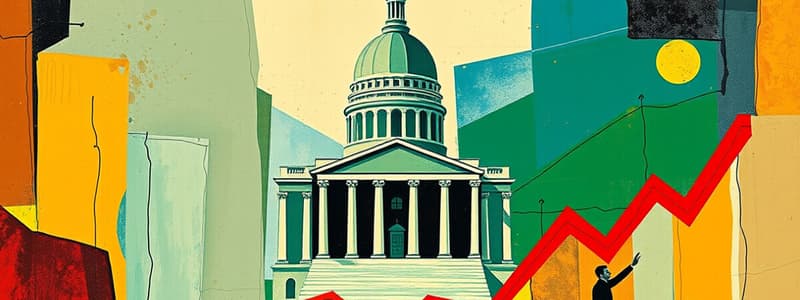Podcast
Questions and Answers
Increasing government spending to build infrastructure tends to shrink the economy.
Increasing government spending to build infrastructure tends to shrink the economy.
False (B)
Deficit spending can be beneficial when unemployment is high.
Deficit spending can be beneficial when unemployment is high.
True (A)
Fiscal policy refers only to taxation.
Fiscal policy refers only to taxation.
False (B)
Contractionary fiscal policy involves increasing public spending.
Contractionary fiscal policy involves increasing public spending.
Expansionary fiscal policy aims to stimulate total spending in the economy.
Expansionary fiscal policy aims to stimulate total spending in the economy.
Contractionary fiscal policy is implemented when spending is increased.
Contractionary fiscal policy is implemented when spending is increased.
Increasing demand through government spending leads to higher employment.
Increasing demand through government spending leads to higher employment.
A budget deficit occurs when the government raises more revenue than it spends.
A budget deficit occurs when the government raises more revenue than it spends.
Printing more money in an economy without a corresponding increase in goods likely leads to inflation.
Printing more money in an economy without a corresponding increase in goods likely leads to inflation.
Governments typically generate revenue exclusively through income tax.
Governments typically generate revenue exclusively through income tax.
Flashcards are hidden until you start studying
Study Notes
Government Spending and Economic Impact
- Government spending boosts economic performance by creating jobs, as seen with infrastructure projects like highways.
- Increased job creation leads to higher household incomes, stimulating consumer purchases and overall economic growth.
- In contrast, higher taxes result in reduced disposable income for households and businesses, which can shrink economic activity.
Deficit Spending
- A budget deficit occurs when government spending exceeds its revenue.
- Governments can finance deficits through borrowing, which can stimulate the economy, especially during high unemployment, by funding projects that employ idle workers.
- However, deficit spending may lead to inflation during low unemployment, as increased competition for workers drives up wages and prices.
Fiscal Policy Basics
- Fiscal policy involves government decisions related to taxation and public spending, alongside monetary policy, which focuses on money supply.
- The combination of fiscal and monetary policies aims to maintain economic growth, high employment levels, and controlled inflation.
Types of Fiscal Policy
- Expansionary Fiscal Policy: Characterized by reduced taxes or increased public spending, aimed at boosting aggregate demand when economic growth is sluggish or unemployment is high.
- Contractionary Fiscal Policy: Involves increasing taxes or cutting public expenditure to reduce demand and control inflation, typically applied during periods of high inflation.
Revenue Generation
- The government raises revenue through various taxes, including income tax, sales tax, and customs duties.
- This revenue is allocated for public projects, government programs, and operational costs, such as salaries for government employees.
Budget Deficits and Financing
- Governments face the choice of running budget deficits by spending more than they collect in taxes.
- Financing options for deficits include:
- Borrowing: Can reduce money supply and increase interest rates, making loans more expensive.
- Printing Money: Increases money supply without a proportional increase in goods, potentially leading to inflation.
Political Considerations
- Fiscal policy decisions are often influenced by political factors, including ideologies about government size and economic interventions.
- Policymakers must balance economic forecasts related to growth and unemployment with budgetary needs to optimize fiscal outcomes.
Studying That Suits You
Use AI to generate personalized quizzes and flashcards to suit your learning preferences.



